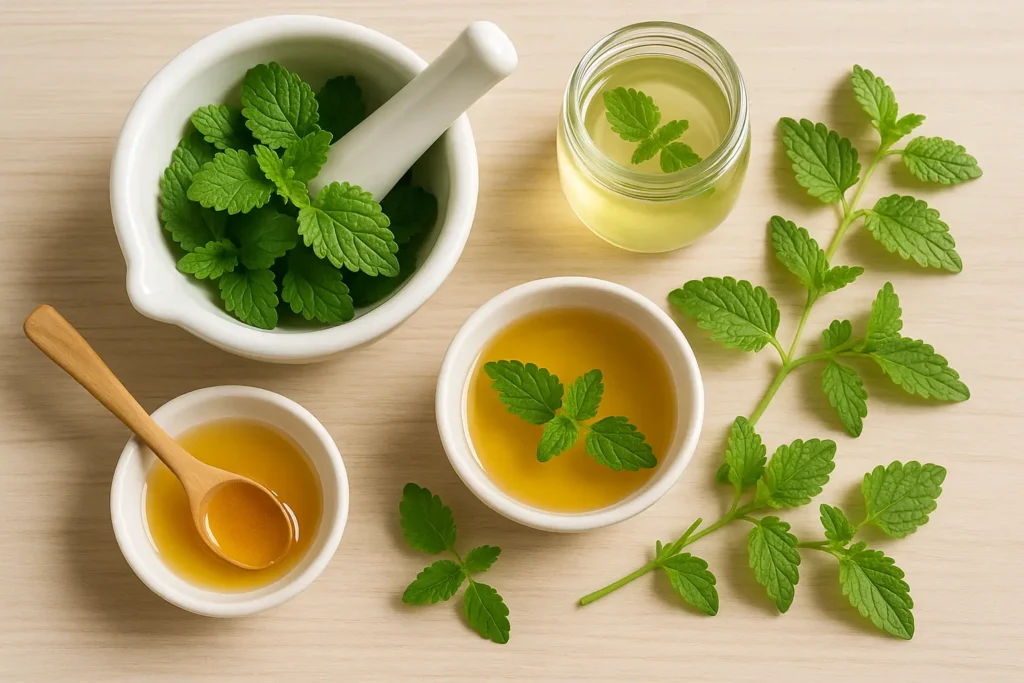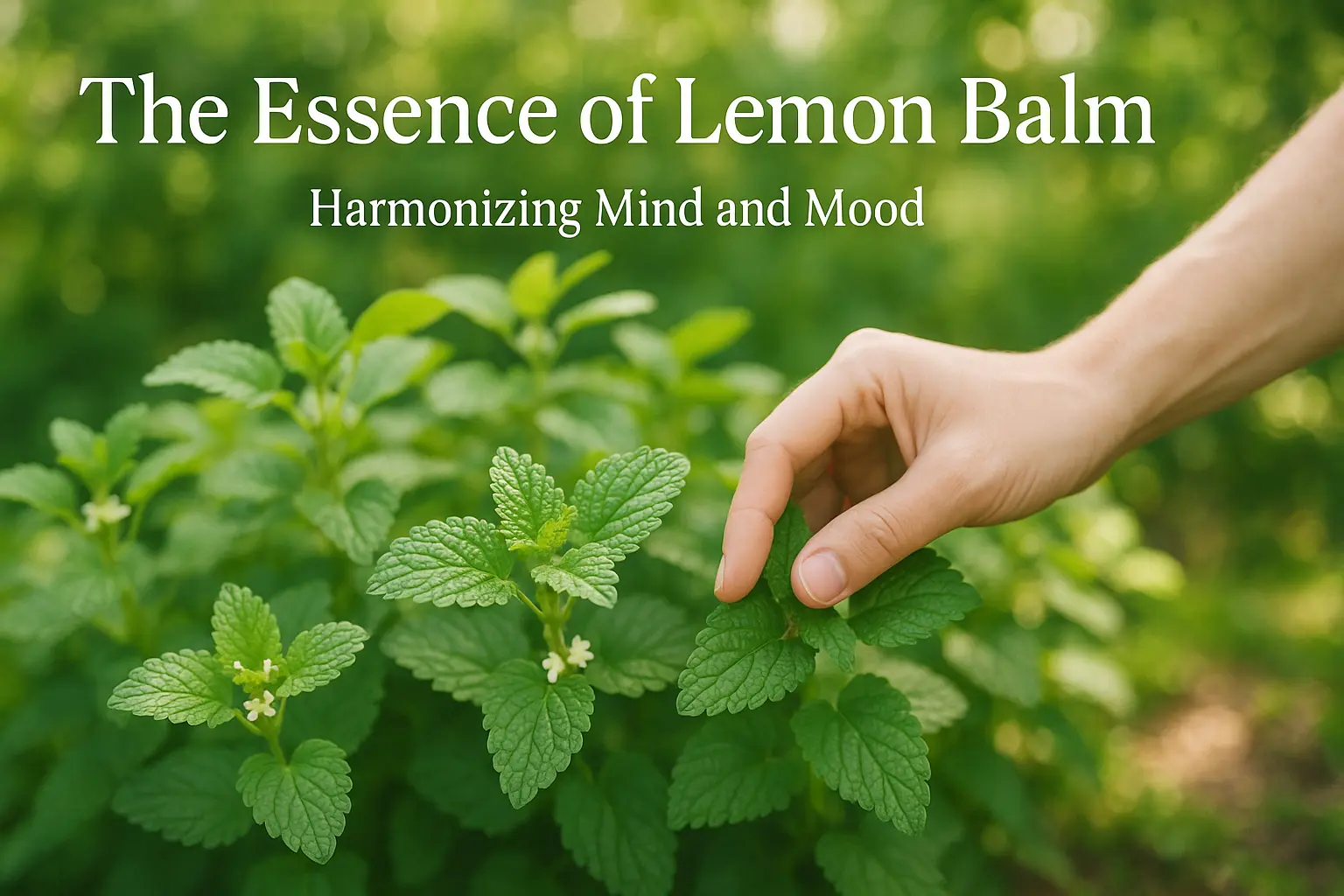Lemon Balm, a herb cherished for centuries, stands as a testament to nature’s gentle power to soothe and heal, offering a window into a world of herbal tranquility.
Overview of Lemon Balm Lemon Balm, scientifically known as Melissa officinalis, is a perennial herb from the mint family Lamiaceae. Renowned for its lemon-scented leaves, this herb is not just a culinary delight but also a powerhouse of therapeutic properties. With its delicate, heart-shaped leaves and tiny white flowers, Lemon Balm exudes a subtle, refreshing aroma that has captivated humans for ages.
This herb is not only celebrated for its delightful fragrance and flavor but also for its versatility. Lemon Balm finds its use in various forms – as a fresh herb, dried leaves, essential oil, and even in extracts. Each form unleashes its own spectrum of benefits, making Lemon Balm a versatile player in the realms of herbal medicine, culinary arts, and aromatherapy.
Historical Background and Origins The origins of Lemon Balm trace back to over 2000 years ago. It is believed to have first been cultivated in the Mediterranean region, and from there, it spread to various parts of Europe and the Middle East. Historically, Lemon Balm was a symbol of love and success and was used in various cultural rituals and ceremonies.
Ancient healers and herbalists recognized the value of Lemon Balm early on. It was widely used in Greek and Roman medicine for its calming and soothing effects, especially for nervous disorders. Lemon Balm also found its place in the gardens of medieval monasteries, where monks used it for its therapeutic properties, particularly in aiding sleep and easing melancholic states.
The Healing Properties of Lemon Balm
Lemon Balm, with its gentle caress and soothing aroma, is more than just a culinary herb; it’s a beacon of healing, embodying centuries of medicinal wisdom.
Overview of Medicinal Benefits The medicinal benefits of Lemon Balm are as diverse as they are profound. At the heart of its healing prowess is its ability to calm and soothe the mind and body. It has been used traditionally to alleviate symptoms of stress and anxiety, promoting a sense of calm and relaxation. The herb contains compounds like rosmarinic acid and terpenes, which have been shown to have mild sedative effects, making Lemon Balm beneficial for those struggling with sleep disorders or restlessness.
Another significant benefit of Lemon Balm is its digestive aid. It helps in relieving discomforts like bloating, indigestion, and gas due to its antispasmodic properties. The herb is also known for its positive effects on cold sores and other viral infections, attributed to its antiviral components.
Lemon Balm’s ability to uplift mood and improve cognitive function is another area of interest. Some studies suggest that it can enhance cognitive abilities and might be helpful in conditions like Alzheimer’s disease.
How It’s Used in Traditional Medicine In traditional medicine, Lemon Balm has been a staple for centuries. Herbalists have used it to treat a myriad of ailments, ranging from wounds and insect bites to headaches and menstrual cramps. Its usage in easing nervous tension and treating symptoms of hysteria and melancholia is well documented in historical texts.
In the form of teas, tinctures, or essential oils, Lemon Balm has been a go-to remedy for calming the mind, enhancing sleep quality, and soothing digestive issues. In topical applications, it has been used to alleviate pain from insect bites and speed up the healing of wounds.

Lemon Balm and Mental Well-being
In the realm of natural remedies for mental wellness, Lemon Balm emerges as a serene oasis, offering relief and tranquility to those navigating the turbulent waters of stress and anxiety.
Its Role in Reducing Stress and Anxiety Lemon Balm has been cherished through the ages for its remarkable ability to soothe the mind and alleviate anxiety. Its mild sedative properties make it an ideal herb for calming nervousness and reducing stress. The magic lies in its unique blend of compounds, such as rosmarinic acid and triterpenes, which have been shown to have a calming effect on the nervous system.
This gentle herb works to quiet the mind, ease tension, and promote a state of relaxed alertness, making it beneficial for those who struggle with anxiety or stress-related issues. The aromatherapy benefits of Lemon Balm, particularly its soothing scent, also contribute to reducing stress levels and enhancing mood.
Benefits for Sleep and Relaxation Lemon Balm’s benefits extend into the realm of sleep, where it acts as a natural sleep aid. Its ability to relax the body and mind paves the way for a peaceful and restful night’s sleep. For those who experience insomnia or disrupted sleep patterns, Lemon Balm can be a natural alternative to help regulate sleep cycles and improve sleep quality.
Additionally, Lemon Balm has been used in traditional medicine as a remedy for restlessness and insomnia, particularly when these issues are related to anxiety or stress. Its gentle sedative effect can help quiet the mind, making it easier to fall asleep and stay asleep through the night.
Lemon Balm in Herbal Teas and Culinary Uses
Lemon Balm, with its delightful lemony scent and soothing properties, not only graces the garden but also brings its unique charm to the kitchen, infusing teas and dishes with its gentle essence.
How to Incorporate Lemon Balm in Teas Lemon Balm tea is a celebrated herbal brew, renowned for its calming effects and delightful flavor. To make a soothing cup of Lemon Balm tea:
- Fresh Lemon Balm Tea: Pluck a few fresh Lemon Balm leaves, rinse them gently, and place them in a cup. Pour hot (not boiling) water over the leaves and let them steep for 5 to 10 minutes. The longer you steep, the more potent the flavor and benefits. You can sweeten it with honey or add a slice of lemon for an extra zesty flavor.
- Dried Lemon Balm Tea: If using dried Lemon Balm, use about one teaspoon per cup of hot water. Steep for about 5 to 10 minutes. Dried Lemon Balm can have a more concentrated flavor, so adjust the quantity as per your taste.
Lemon Balm tea can be enjoyed at any time of the day, but it’s particularly beneficial in the evening to wind down and prepare for a restful night’s sleep.
Culinary Recipes and Ideas Lemon Balm’s culinary uses are as versatile as they are delightful. Here are some ideas to incorporate Lemon Balm into your cooking:
- Lemon Balm Pesto: Replace basil with fresh Lemon Balm leaves to create a unique twist on traditional pesto. Blend it with garlic, pine nuts, Parmesan cheese, and olive oil for a fresh herbal sauce perfect for pasta and salads.
- Infused Water and Beverages: Add fresh Lemon Balm leaves to water, iced teas, or lemonades for a refreshing and calming drink.
- Lemon Balm Butter: Mix chopped Lemon Balm leaves into softened butter to create an aromatic spread for bread and crackers.
- Salads and Dressings: Chopped fresh Lemon Balm can be sprinkled over salads or mixed into dressings for a lemony tang.
- Desserts: Lemon Balm can be used in desserts, such as sorbets, fruit salads, or cakes, adding a subtle lemon flavor.
Lemon Balm for Digestive Health
Lemon Balm, a herb adorned with a myriad of healing properties, shines particularly brightly in the realm of digestive health, offering soothing relief for various gastrointestinal discomforts.
Its Use in Soothing Digestive Issues Lemon Balm has been used traditionally to ease digestive ailments, thanks to its antispasmodic and carminative properties. It works wonders in alleviating symptoms like bloating, gas, and stomach cramps, making it a go-to remedy for those experiencing discomfort after meals.
For individuals suffering from indigestion or dyspepsia, Lemon Balm can be a gentle yet effective solution. Its calming effect on the digestive tract helps relax the muscles of the stomach and intestines, which can alleviate spasms and pain associated with digestion. It’s also beneficial for those with irritable bowel syndrome (IBS), as it can help reduce the frequency and intensity of symptoms.
The Science Behind Its Effectiveness The effectiveness of Lemon Balm in treating digestive issues is backed by science. Its primary active compounds, including rosmarinic acid and various essential oils like citronellal, contribute to its digestive benefits. These compounds are known to relax the smooth muscles of the digestive tract, thereby reducing spasms and easing discomfort.
Additionally, the aromatic compounds in Lemon Balm, which give it its distinctive lemony scent, also play a role in stimulating the digestive system. They help to increase the production of digestive juices and bile, aiding in the more efficient breakdown of food and absorption of nutrients.

Skin Care Benefits of Lemon Balm
Lemon Balm, a herb celebrated for its soothing aroma, also emerges as a cherished ingredient in skin care, offering nature’s gentle touch for radiant, healthy skin.
How Lemon Balm is Used in Skin Care Lemon Balm’s foray into skin care is rooted in its natural anti-inflammatory and antimicrobial properties, making it an excellent choice for soothing skin irritations and combating bacterial infections. It is particularly beneficial for sensitive skin types, providing relief from redness and itchiness.
The herb’s rich antioxidant content, primarily in the form of flavonoids and phenolic acids, helps protect the skin from environmental stressors and aging. These antioxidants can reduce the damage caused by free radicals, thereby helping to maintain youthful and vibrant skin.
Lemon Balm is also known for its astringent properties, which can help cleanse and tighten the skin, reducing the appearance of pores and enhancing skin tone.
DIY Recipes for Natural Skin Care
- Lemon Balm Facial Toner: Brew a strong Lemon Balm tea, let it cool, and then use it as a facial toner. This can help soothe the skin, reduce pore size, and restore natural pH balance.
- Lemon Balm and Honey Face Mask: Mix fresh Lemon Balm leaves with honey to create a nourishing face mask. Apply it to the face for 15-20 minutes before rinsing. This mask is great for moisturizing and calming irritated skin.
- Lemon Balm Infused Oil: Infuse Lemon Balm in a carrier oil like sweet almond or jojoba oil for a few weeks. Strain and use the oil as a natural moisturizer or to soothe skin irritations.
- Lemon Balm Ice Cubes: Freeze Lemon Balm tea in an ice cube tray and use the ice cubes to soothe puffy or irritated skin. This is especially refreshing during hot summer days.
Lemon Balm as a Natural Remedy for Cold and Flu
In the realm of natural healing, Lemon Balm stands out as a beacon of relief, especially during the cold and flu season, offering its antiviral prowess to those seeking comfort from seasonal ailments.
Its Antiviral Properties Lemon Balm is renowned for its antiviral properties, primarily attributed to compounds like rosmarinic acid and flavonoids. These compounds have been shown to be effective against a variety of viruses, including those that cause common colds and the flu. Lemon Balm’s antiviral action is not just limited to prevention; it can also help reduce the duration and severity of symptoms if you’re already under the weather.
The herb’s ability to boost the immune system further bolsters its role in combating cold and flu viruses. By enhancing the body’s natural defense mechanisms, Lemon Balm helps in quicker recovery and lessens the chances of secondary infections.
How to Use Lemon Balm in Cold Remedies
- Lemon Balm Tea: Brewing a hot cup of Lemon Balm tea is one of the simplest ways to utilize its antiviral benefits. Add fresh or dried Lemon Balm leaves to boiling water, steep for 10 minutes, and drink it warm. This can help soothe a sore throat, reduce congestion, and promote relaxation.
- Lemon Balm and Honey Syrup: Combine Lemon Balm with honey to make a soothing syrup. Honey adds its own antibacterial properties and can make the remedy more palatable, especially for children.
- Lemon Balm Steam Inhalation: For congestion relief, add a few drops of Lemon Balm essential oil to a bowl of hot water and inhale the steam. This can help clear nasal passages and alleviate respiratory discomfort.
- Lemon Balm Bath: For overall relaxation and symptom relief, adding Lemon Balm leaves or essential oil to a warm bath can provide a soothing experience.
Lemon Balm and Its Antioxidant Properties
Lemon Balm, a cherished herb in the garden of wellness, not only delights the senses but also offers a bastion of health, thanks to its potent antioxidant properties.
The Science Behind Its Antioxidant Benefits The secret to Lemon Balm’s antioxidant prowess lies in its rich composition of phenolic compounds, flavonoids, and terpenes. These natural compounds are powerful scavengers of free radicals, unstable molecules that can cause cellular damage leading to chronic diseases and aging. Rosmarinic acid, one of the primary antioxidants in Lemon Balm, is especially noted for its ability to neutralize harmful free radicals.
These antioxidants play a crucial role in protecting the body’s cells from oxidative stress, a condition that arises when there’s an imbalance between free radicals and antioxidants in the body. By neutralizing free radicals, Lemon Balm helps mitigate the risk of oxidative stress, which is linked to various chronic conditions like heart disease, cancer, and neurodegenerative disorders.
Impact on Overall Health The antioxidant effects of Lemon Balm extend far beyond just combating oxidative stress. They contribute to overall health and well-being in several ways:
- Enhancing Brain Health: Antioxidants in Lemon Balm can have a protective effect on brain health, potentially improving cognitive function and reducing the risk of neurodegenerative diseases.
- Skin Health: The topical application of Lemon Balm, due to its antioxidants, can help in reducing skin aging, protecting against UV-induced damage, and promoting skin healing.
- Cardiovascular Health: By combating oxidative damage in blood vessels and the heart, Lemon Balm’s antioxidants support cardiovascular health.
- Immune System Support: Antioxidants also play a role in strengthening the immune system, making the body more capable of fighting off infections and diseases.

Lemon Balm in Aromatherapy
In the soothing world of aromatherapy, Lemon Balm emerges as a harmonizing essence, offering its fragrant embrace to nurture mental and emotional well-being.
Its Use in Essential Oils Lemon Balm essential oil, distilled from the leaves of the Melissa officinalis plant, is a prized component in the practice of aromatherapy. This oil encapsulates the essence of Lemon Balm – its refreshing, lemony scent with a hint of herbaceous warmth. It is used in various forms, such as in diffusers, personal inhalers, or blended with carrier oils for topical application.
The versatility of Lemon Balm essential oil lies in its ability to blend well with other essential oils. It pairs beautifully with floral scents like lavender and rose, citrus oils such as lemon and bergamot, and even woodsy aromas like cedarwood, creating a symphony of scents that can be tailored for specific therapeutic needs.
Benefits for Mental and Emotional Health The aromatic properties of Lemon Balm have a direct impact on mental and emotional health. When inhaled, the scent molecules travel from the olfactory nerves directly to the brain and impact the amygdala, the emotional center of the brain.
- Stress Relief: The aroma of Lemon Balm is known for its calming effect on the mind, making it an excellent aid for reducing stress. It helps in soothing nerves and alleviating feelings of anxiety.
- Enhancing Mood: The uplifting fragrance of Lemon Balm can help dispel melancholy and bring about a more positive state of mind. It’s beneficial for those dealing with mild depression or seasonal mood changes.
- Improving Sleep Quality: For individuals struggling with sleep disturbances, Lemon Balm can be a gentle remedy. Its relaxing properties help in preparing the mind and body for a restful night’s sleep.
- Cognitive Support: Lemon Balm is also known for its ability to enhance cognitive functions, including memory and alertness, making it a helpful aid during times of mental fatigue.
Lemon Balm in Alternative Therapies
In the realm of alternative therapies, Lemon Balm is revered not just as a herb but as a holistic healing agent, seamlessly integrating into practices that promote overall wellness.
Its Role in Holistic Health Practices Lemon Balm’s versatility makes it a cherished component in various holistic health practices. Its calming properties are harnessed in aromatherapy, where its essential oil is used to alleviate stress, anxiety, and promote relaxation. This is particularly beneficial in practices like yoga and meditation, where a calm and focused mind is essential.
In phytotherapy (herbal medicine), Lemon Balm is often used for its ability to soothe the nervous system, making it a go-to herb for treating insomnia, nervousness, and migraines. Its antispasmodic properties also make it effective in alleviating menstrual cramps and digestive discomfort.
Moreover, Lemon Balm finds its place in naturopathy, where it is used in tinctures, salves, and teas to harness its full spectrum of healing properties. Naturopaths often recommend Lemon Balm for its mood-enhancing properties, as well as its ability to improve cognitive function and memory.
Combinations with Other Herbs Lemon Balm’s mild nature allows it to be beautifully paired with other herbs for enhanced therapeutic effects:
- With Lavender: For relaxation, combining Lemon Balm with Lavender enhances its stress-relieving and sleep-inducing properties.
- With Peppermint: In digestive remedies, Lemon Balm blends well with Peppermint to soothe stomach ailments and improve digestion.
- With Valerian: For sleep disturbances, Lemon Balm is often combined with Valerian, another herb known for its sedative properties, to promote restful sleep.
- With Chamomile: This combination is popular in herbal teas for its calming effect and is particularly beneficial in reducing anxiety and calming the nervous system.
Research and Studies on Lemon Balm
As Lemon Balm continues to be a subject of fascination in the scientific community, recent studies have begun to unravel more about this herb’s extensive capabilities, shining a light on its potential in modern medicine.
Overview of Recent Scientific Studies Recent research on Lemon Balm has focused on various aspects of its medicinal properties, delving into its effects on mental health, sleep, digestion, and more. These studies often employ various forms of Lemon Balm, including extracts, essential oils, and dried leaves, to assess their specific impacts.
One significant area of research is Lemon Balm’s effect on cognitive function and mental health. Studies have investigated its potential in improving memory and attention, particularly in conditions like Alzheimer’s disease. The results suggest that Lemon Balm may help in enhancing cognitive abilities and mood, possibly due to its antioxidant properties and positive impact on brain function.
Another focal point of research is the herb’s role in managing stress and anxiety. Clinical trials have explored the efficacy of Lemon Balm in reducing symptoms of anxiety and stress-related disorders. These studies often highlight its calming effects, attributing them to the herb’s ability to modulate neurotransmitter activity in the brain.
Emerging Research Findings Emerging research is also looking at Lemon Balm’s role in sleep. Some studies suggest that Lemon Balm, often in combination with other herbs like valerian, can improve sleep quality and help in treating insomnia.
Additionally, research on Lemon Balm’s antiviral properties, particularly against herpes simplex virus (HSV), has shown promising results. Studies indicate that compounds in Lemon Balm can inhibit the replication of HSV, offering a potential natural remedy for cold sores.
There is also growing interest in Lemon Balm’s impact on digestive health, with studies examining its use in treating gastrointestinal disorders like irritable bowel syndrome (IBS) and indigestion.
Conclusion
As we culminate our exploration of Lemon Balm, it’s evident that this humble herb is a cornucopia of healing, offering a natural pathway to health and well-being.
Recap of the Benefits of Lemon Balm Lemon Balm, with its serene aroma and gentle healing properties, has proven to be a versatile ally in holistic health. Its ability to soothe stress and anxiety, enhance sleep quality, and improve mental clarity positions it as a beacon of mental and emotional wellness. The herb’s antiviral properties and its effectiveness in treating digestive ailments further extend its healing reach.
The scientific community’s growing interest in Lemon Balm underscores its potential in various medicinal applications, from cognitive support to managing viral infections. Additionally, its role in aromatherapy and skin care highlights its multifaceted nature.
Encouraging Natural and Holistic Health Practices Embracing Lemon Balm in our daily lives is more than just turning to a natural remedy; it’s about adopting a holistic approach to health. Whether it’s through a soothing cup of Lemon Balm tea, a calming aromatherapy session, or using it in culinary creations, this herb invites us to explore the harmonious balance of body and mind.
Lemon Balm’s journey from ancient monastic gardens to modern research labs is a testament to its enduring appeal and efficacy. As we continue to navigate the challenges of modern living, the time-honored wisdom encapsulated in Lemon Balm serves as a reminder of the gentle yet powerful healing found in nature.
Resources
- National Center for Complementary and Integrative Health (NCCIH): Offers comprehensive information on Lemon Balm, including its use in alternative therapies and ongoing research. Explore NCCIH’s Resources on Lemon Balm
- WebMD – Lemon Balm Overview: Provides detailed insights into Lemon Balm, covering its benefits, side effects, and interactions with other medications. Check Out WebMD’s Lemon Balm Section
- Healthline – Lemon Balm Uses and Benefits: A user-friendly guide that offers an in-depth look at various aspects of Lemon Balm, from health benefits to usage tips. Visit Healthline for Lemon Balm Information
- The Herbal Academy: Offers educational materials and articles on Lemon Balm, highlighting its role in herbalism and natural medicine. Learn More from The Herbal Academy
- PubMed: Access a wide range of scientific studies and clinical research papers on Lemon Balm to understand its medicinal properties and benefits. Explore PubMed for Lemon Balm Research


0 thoughts on “Harmonizing Mind and Mood with the Magic of Lemon Balm”